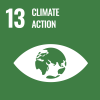Beira, 24 March 2023 – On the early morning of Wednesday, 22 February, 55-year-old Helena was woken up by the sound of the wind beating against the iron sheet roof of her house. As heavy rains started to hit the city, she watched how the water level began to rise around her, carrying away belongings and pieces of surrounding houses. This marked the landfall of what would later be the longest-lasting tropical cyclone to ever exist.
Though it was still dark outside, and the rain showed no signs of stopping, the widow and grandmother, who lives with her granddaughter in the Ndunda neighbourhood in the city of Beira, Mozambique, knew she had to look for shelter in a safer place as soon as possible. She tightly held onto her 10-year-old granddaughter as they left the house.
"She wanted to take her drawings with her so they wouldn't get wet and lost in the water. It was very hard to explain that we had to leave everything behind, but our lives were more important."

Cyclone Freddy first hit Mozambique as a Tropical Storm on 24 February, after which it returned to the Indian Ocean and returned as stronger Tropical Cyclone on 11 March. It has left widespread destruction and displacement across central and southern Mozambique. Photo: IOM 2023
Over the past five weeks Cyclone Freddy has caused deaths, flooded homes, lost harvests and left many displaced across Southern Africa. In Mozambique alone, more than 975,000 people have been affected as a consequence of Freddy’s two impacts, as well as the cholera outbreak which has worsened due to flooding.
Through the rain, Helena and her granddaughter made their way to Muthemba Secondary School, which was opened as a temporary accommodation centre for those in need of shelter. The uncertainty in the centre was overwhelming. Hundreds of families were arriving, seeking refuge as their homes became unsafe during the storm.
The heavy rains on the already saturated soil continued to flood areas across the region in the days after Freddy passed, making it difficult for people to return to their homes, and to access clean water and health care.

Helena and her neighbours have been seeking shelter in a temporary accommodation centre after the heavy rains of Cyclone Freddy flooded their homes. Photo: IOM 2023/Cesaltino Vilanculo
Helena is the primary caregiver of her granddaughter – also named Helena, just like her grandmother – after she became orphaned. As the head of the household, she already struggled to make ends meet before Freddy, and little Helena had to drop out of Grade 3 because they could not afford school materials and school fees.
“My heart sinks as I think about the possibility of having lost everything,” Grandmother Helena adds.
Days have turned into weeks at the crowded centre, but through the hardship, Helena wants to remain strong for her granddaughter and continue with their daily lives as much as possible. She finds support from the many neighbours that have also had to seek shelter at the centre, and keeps hoping to return home soon. Meanwhile, little Helena has made new friends with whom she plays: "But I wish I had my toys here to play and share them with my new friends."

Helena and her granddaughter try to remain hopeful while they wait at the temporary accommodation centre for the floods to go down. Photo: IOM 2023/Cesaltino Vilanculo
Climate change is making the impact of climate shocks like Cyclone Freddy more frequent and more intense. Mozambique is among one of the most vulnerable countries in Africa to the impact of climate change, and households like Helena’s that have little to no means to fall back on are usually the ones that get affected the most. Climate change mitigation and adaptation interventions, as well as durable solutions for those affected, are urgently needed to increase the resilience of the people most at risk and avoid future damage, losses and forced displacement.
IOM Mozambique’s teams are closely working with the Government of Mozambique and humanitarian partners to respond to the needs following Cyclone Freddy. The International Organization for Migration (IOM) is upscaling its response to lifesaving needs of families affected, including emergency shelter and tools to repair houses, primary health care, hygiene promotion and cholera prevention through mobile brigades and community activists, as well as supporting the government with the management of temporary accommodation centres and community engagement.
IOM's response in Mozambique is supported by USAID’s Bureau for Humanitarian Assistance (BHA), UK Government's Foreign, Commonwealth & Development Office (FCDO) and the Government of Ireland.
This story was written by María Toro, IOM Communications Officer in Mozambique



